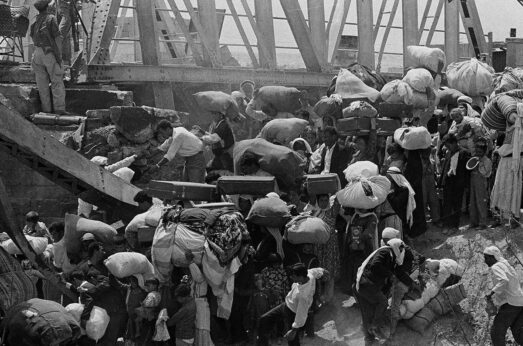
Initially dismissed by some of Israel’s U.S. supporters as the fantasy of a few fanatics in Netanyahu’s ruling coalition, permanently pushing Palestinians out of Gaza is now confirmed as the preferred policy option of the Israeli Intelligence Ministry.

A leaked document published by local Israeli news outlet Sicha Mekomit reveals a plan to send Gaza residents fleeing into the desert of Egypt’s Sinai Peninsula, never to return.
The scheme essentially amounts to a repeat of what the Palestinians call the “Nakba”—“Catastrophe,” the 1948 mass expulsion of Arab residents to make way for the founding of the State of Israel.
Dated Oct. 13, the secret deportation directive outlines four stages, some of which have already been executed.
First, all Palestinian civilians are to be told to vacate northern Gaza in advance of Israeli Defense Forces (IDF) ground operations. This is to be sold to the world as an effort to avoid unnecessary civilian casualties while the military targets Hamas. The evacuation warning was announced the same day that the Intelligence Ministry distributed this plan among the Netanyahu cabinet.

Second, the IDF is to begin a sequence of land assaults moving from north to south down the Gaza Strip. In conjunction with sustained airstrikes, the ground campaign aims to physically clear Palestinians, basically bulldozing people off the land.
This stage is currently underway, with Israeli tanks reportedly closing in on Gaza City as of press time. According to the plan, Hamas fighters will be “cleansed,” and the entire Gaza Strip will be permanently occupied by Israel.
Third, all routes out of Gaza—except the Rafah border crossing into Egypt—are to be kept tightly sealed, leaving Palestinians only one way to escape destruction. “It is important to leave the traffic lanes towards the south usable, to allow the evacuation of the civilian population towards Rafah,” the ministry told the cabinet.
Thus far in the war, the Egyptian government’s refusal to accept refugees has upset the full implementation of this phase, but the IDF remains determined to keep pressing Gazans in that direction regardless.
Fourth, if Egypt can be convinced to take the Palestinians, Israel would construct tent cities in the northern Sinai desert and eventually build whole cities to permanently resettle the people that had been expelled from their homes and land.
The Intelligence Ministry recommends creating “a sterile zone of several kilometers inside Egypt and not allow the population to return to activity or residence near the Israeli border”—a forever no-man’s land.
The authors of the policy document say it is absolutely necessary to “motivate” Palestinians to agree to leave and give up their lands via a sustained propaganda effort. “The messages should revolve around the loss of the land, making clear that there is no longer any hope of returning to the territories that Israel will occupy in the near future,” it says.
The ministry clumsily envisions using residents’ adherence to Islam to convince them to leave. “Allah made sure that you lost this land because of the leadership of Hamas,” a draft script says. “There is no choice but to move to another place with the help of your Muslim brothers.”
It also calls for the international community, especially Israel’s top ally, the United States, to help implement the expulsion by putting the squeeze on Egyptian dictator Abdel Fattah al-Sisi to accept Israel’s demands.
Washington is also expected to pressure countries like Greece, Spain, Turkey, Qatar, Saudi Arabia, the U.A.E., and others to take in refugees since it’s not expected that Egypt would take them all. Canada, in particular, is targeted by the ministry for what the document calls its “lenient” immigration policies.
The ethnic cleansing of Gaza is to be pitched in the Western media “in a way that does not incite and blacken Israel.” To avoid it being seen as the mass deportation that it really is, the plot is to be presented as a humanitarian measure that will lead to “fewer casualties among the civilian population.”
The notion that Palestinians would buy into such a self-defeating scheme was delusional.
“We are against transfer to any place, in any form, and we consider it a red line that we will not allow to be crossed,” Nabil Abu Rudeineh, a spokesperson for Palestinian President Mahmoud Abbas told the press. “What happened in 1948 will not be allowed to happen again.”
There has so far been no official Egyptian response to the strategy paper, but throughout the war, al-Sisi’s government has repeatedly stressed it will not accept a deluge of Palestinian refugees. During the 1948 war, Israeli forces drove hundreds of thousands of Palestinians into Egyptian territory and neighboring countries like Jordan.
If a land grab on such a scale were to happen again, it would make a future Palestinian state essentially impossible.
Once the document was leaked to the media, officials with the Netanyahu government immediately tried to downplay its relevance. The Prime Minister’s Office told the Israeli newspaper Haaretz that it only represented some “initial thoughts,” not a finalized policy. A spokesperson called it nothing but a “concept paper.”
Pro-government media joined in the effort, saying the Intelligence Ministry is akin to an in-house think tank and does not have any binding authority when it comes to military strategy.
Regardless, the Intelligence Ministry is not the only influential body advocating for a genocidal outcome.
Last week, a scheme was circulated among the Israeli policy establishment by the Misgav Institute for National Security and Zionist Strategy, a research group headed by Meir Ben Shabbat. He was previously Netanyahu’s National Security Advisor and is a 30-year veteran of the Shabak, Israel’s secret police agency.
Misgav’s proposal closely mirrors the course of action advocated by the Intelligence Ministry. The author of the Misgav paper is extremist Knesset member Amir Weitmann. He laid out a detailed economic case for forced resettlement, including an assessment of the number of empty homes in Egypt and the financial costs Israel would incur to buy them to house Gazans.
After controversy erupted over the paper, the Misgav Institute removed it from its website, but the goal of injecting the idea of permanent resettlement into the public debate was achieved. The personal connections between Misgav and the government suggest coordination. According to Mekomit, Weitmann is a close associate of Gila Gamliel, the head of the Intelligence Ministry.
It has also been discovered that just over a month ago, the ministry pledged to transfer one million shekels (approx. $250,000 USD) to Misgav’s bank account to “conduct research” on Arab countries. A short time later, Weitmann’s Egyptian housing market analysis appeared.
The ministry claimed the compromised expulsion plan was solely its own work and was not connected to Misgav, but the government document first surfaced on a WhatsApp group populated by extreme right-wing activists who lobby, along with Weitmann, for the expansion of illegal Israeli settlements in Gaza.
The sequence of events—with first the Misgav paper and now the Intelligence Ministry strategy statement “leaking”—suggests that there was nothing accidental about either document going public.

Instead, it appears likely that a trial balloon is being floated, perhaps with even Netanyahu’s personal approval, to test domestic Israeli and international reaction to an explicit policy of ethnic cleansing.
Several in the government have concluded that the final expulsion of Gaza’s Palestinian population is the only option. Leaving Hamas in charge is politically impossible after Oct. 7th, and no alternative group exists to take over locally.
A West Bank model of direct Israeli occupation while Palestinians continue to live in the territory isn’t viewed as sustainable in the long term, since political opposition at home and abroad would inevitably escalate.
Letting Mahmoud Abbas and the Palestinian Authority, who already govern the West Bank, take over Gaza is viewed as the worst possible outcome by Intelligence Ministry strategists because it would put the major Palestinian territories—except Israeli-annexed East Jerusalem—under the control of a single government.
Maintaining the physical and political division of the West Bank and Gaza is a must for Israeli policymakers, as this split is one of the primary obstacles blocking the formation of a Palestinian state.
“It is not acceptable for this attack [Oct. 7th] to result in a victory for the Palestinian national movement or to pave the way for the establishment of a Palestinian state,” the Intelligence Ministry concluded.
To prevent that from happening, it has settled on a decision to eliminate the Palestinian people from Gaza. Despite claims to the contrary, it appears the Netanyahu government is following that strategy all the way to its bloody conclusion.










